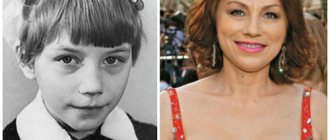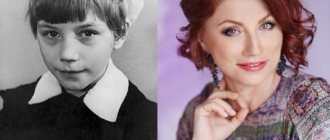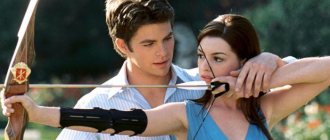Rosa Khairullina: biography
Russian theater and film actress Roza Khairullina is widely known in theater circles. The dramatic images she created amaze viewers with their depth of character and are remembered for a lifetime. Film lovers discovered Khairullina’s talent only in the 2000s. The theatrical experience and unusual appearance of the mature actress helped her to be remembered by the audience from her very first film work.
Video course “Spring”
Landscaping for busy people, a beautiful garden without the hassle
A training course for those who want to make their dacha beautiful and prefer to spend their time, effort and money wisely.
Special offer! 50% discount! Make good use of your self-isolation!
₽ 1200.00 ₽ 600.00
MORE ❯❯❯
Actress Roza Khairullina
Rosa Khairullina's contribution to the development of Russian theater is recognized by critics and journalists, confirmed by the Nika awards, the State Prize in the field of literature and art, and theater awards. International recognition is evidenced by the Stanislavsky Prize and the Silver George Award.
Roza Khairullina: In the theater, like in love, you either get married or you don’t
Dossier. Honored Artist of the Russian Federation and Tatarstan, laureate of the State Prize of the Russian Federation, theater and film actress Roza Vakilyevna Khairullina was born on September 12, 1961 in Norilsk. Graduated from the Kazan Theater School. She played on the stages of the Kazan Theater for Young Spectators, the Theater named after. Lensovet, Samara Academic Drama Theater named after M. Gorky. In 1996 she received her first highest theater award, the Golden Mask. In 2009, she was invited to join the troupe of the Moscow Theater Studio under the direction of Oleg Tabakov. Plays on the stage of the Moscow Art Theater. Chekhov, St. Petersburg Theater "Comedian's Shelter", Theater of Nations. At the 2012 Moscow International Film Festival she was recognized as best actress for her role as Khansha Taidula in the film “Horde” directed by Andrei Proshkin. For the same role in 2013 she received the national award of the Russian Academy of Cinematographic Arts “Nika”.
Her participation in any performance or film makes them an event. She appears on theater stages as Alyosha Karamazov, Nina Zarechnaya in “The Seagull” and Murzavetskaya in “Wolves and Sheep”, Lyra in the play “King Lear”.
The strict metropolitan theater critic Marina Timasheva does not hide her love for the actress: “You cannot say ‘I don’t believe’ in her. It’s impossible, even when she plays a seemingly small role. For example, Red Ariel in “The Tempest” by Shakespeare Tseitlin. There were four Ariels, Ariels-actors, equally loving and hating their director - Prospero. They carried out all his whims, whims and orders. But only one failed: Red Ariel. Rosa Khairullina. She spoke of freedom as happiness. She begged her owner to let her go free. A few seconds, and what a powerful memory! I write and see her eyes - flaming, black, in love.”
Theater experts call the actress unique, piercing and even great. She herself does not consider herself to be such: “ I only convey what was put into the role by the director.”
— Rose, an author’s composition based on Shakespeare’s tragedy, the works of Nietzsche, Varlam Shalamov and the poems of Paul Celan Konstantin Bogomolov’s “Lear,” staged by him as a comedy, caused a mixed reaction. You play the main role in the play. What do you think of this production?
- I really like her. From start to finish. How I like every talented work. Whether or not I share the director’s author’s statements is another matter.
— How do you feel as a man?
— The director set me the task of playing a person. Not a man or a woman. And I worked for her. Played Man.
— Do you ever challenge the director’s concept?
- I don't argue with him. Either I accept the director’s offer or I don’t. In the theater, as in love, you either get married or you don’t. And wasting time on arguments is a useless activity.
— Was Bogomolov’s proposal unexpected?
- Not really. At the Samara Theater we worked with him on the play “Olesya”. He transported me to Moscow. I am glad that this person appeared in my life. He finds words that help me live. Puts my head back in place. And gives me work. Believing in me. There was a moment when I thought that I had no right to go on stage because I didn’t bring joy to the world. And people miss her so much!
— Do you have a favorite role?
- Everyone is loved. But there is a special one. Pinocchio. She played her in Samara in a play based on the play by Adolf Yakovlevich Shapiro. It's about me. About a man who grew up in poverty and in the unfair treatment of others. I played Pinocchio from a boy to a hundred-year-old man. The performance was not for children, but the children perceived it very deeply. I was told that one boy cried in the toilet after the first act and said: “She doesn’t have the heart to finish it.”
— Recently, people have started talking about Tolstoy’s “Pinocchio” as a book not for children. Someone even said that this is a parody of the Silver Age model.
- I do not think so. There is a lot of educational stuff there for both children and adults. At every age you discover something new. Tolstoy laid it down. Only an adult can understand that Pierrot is an absolute Blok. Malvina - Lyubov Mendeleeva. This is their relationship. “Pinocchio,” which we read when we were very young, is an adaptation for children. This becomes clear when you read the recently published full version of the tale. In the form in which Tolstoy wrote it. I played exactly this Pinocchio. If she didn’t finish the game, she didn’t get rid of him completely. Pinocchio is a diagnosis. You need to understand how to live with this name... With the name of a boy who experiences his first tears after eating an onion, and says at the same time: “Thank you, it’s delicious.” Arriving at the theater for the first time, he sees the artists being brutally beaten. I trusted and experienced on the Field of Miracles what betrayal is. My Pinocchio hanged himself after this scene. The first sensations of childhood are forgotten. But they are very sharp and remain in the subconscious. 70 percent of us adults are our childhood. What is ingrained in childhood remains for life. Our rulers are also from childhood - from unfinished games. My Pinocchio says, having lived his life: “I don’t want this theater.” He perceived theater as life. And that’s how I perceive it. Each person plays his own life. The main thing for adults in school, in a theater group, in a sports section is to work with each child individually, teaching them to be free. From other people's ambitions, other people's opinions. Instilling in everyone that he is an individual. But here, starting from kindergarten, everything is leveled out.
— Rosa Khairullina is called Bogomolov’s actress. I don't think this is within your range.
“I don’t agree that he is my director and I am his actress.” I am the cog that is needed in his performance. Olga Mikhailovna Yakovleva impoverished herself for decades after the death of Efros. An actor should work with any director. But the director takes the actor he needs. I cannot and do not want to please everyone. I am a piece “good”.
— You often take on cameo roles in films. Why?
— Because you can open up in them and help the director realize his plan.
— For an actress without a clear role, which roles bring more joy - tragic or comedic?
- I have no division. Maybe because only roles bring me joy in life. Any. The meaning of life for me is to be in my profession 24 hours a day. In what I can and love to do.
— During the Evpatoria festival “Earth. Theater. Children" you came up with a story that connected the heroes of "The Cherry Orchard" and "Pinocchio". Unexpectedly...How did this idea come about? Will it be clear to the audience?
- I want to be understood. I'll tell you a secret. Lately I have been very worried about people losing themselves. I am no exception to this, unfortunately. I lost myself. I need this project to return to myself. I would like to meet the Rose that I once was: with hopes in my soul, unburdened by losses.
— What brought you to the Golden Key Theater?
- Not what, but who. People who work here for the sake of children, for children, opening up the world of creativity for them. Children. I look into their eyes and share the joy they experience on stage even in the tiniest role - a mouse, a worm... I need this, because in my profession I have begun to turn into a machine. I began to follow the established path too often. I see how for many people in the capital, acting is turning into a craft. This upsets me. Sometimes the thought even arises: why did you leave Samara?..
— Was it more interesting there?
“There I understood why I was going on stage. For what kind of audience do I play every evening: for the person who comes after his shift at the factory to look at me.
— But in Moscow you also have your own audience.
- Eat. But he's different. Completely different.
- Less sensitive in perception?
— Moscow viewers want a show. They demand: come out and surprise.
“Everywhere there is a viewer who goes for certain actors, for certain directors who, despite the general tendency, dare to follow their line.
— That's right, but you need to educate your viewers. Kostya Bogomolov raised a whole generation that follows him. But he also went through a search. First of all, yourself.
— What do you miss in the current viewer?
— Reflections. I want the viewer to work with me. And he only wants to have fun. The theater has turned into a consumer theater, “haval”, I would say. This doesn't mean I'm against, say, sitcoms. Not at all. There may be such reflections... But now it turns out that it is in the text, and not in the scene, alas! It's comedy club time. Not my time.
— I remembered your phrase at the Nika award ceremony: “Steppe, thank you for hearing me.” Is the steppe an essential concept of nature for you?
— Not just for me. For all. Everyone has it. And the theater has it. But the theater has lost this “steppe”. Taidula is not just a person for me. She is the steppe, the wind... That’s how I played her – with inhuman means. By smell. Blind, she lives by smell. And when her sight returns, she gallops off to the steppe to die. Connects with the steppe. It took me a long time to get to this role. And now she has “settled” in me for a long time.
— You once said that the line between the viewer and the stage should be erased, and for this the viewer should look at the stage as if through a keyhole. Is this always decent?
- I think so. This is why people come to the theater. There must be a moment of shock. The viewer needs it. A feeling that opens his eyes to what is not visible in everyday life.
— But then the line between decency and indecency becomes blurred. As children, we were taught: don’t look through the keyhole, don’t spy on your parents...
- But we still spied. Remember Sergio Leone's greatest film, Once Upon a Time in America, in which everything was filmed through this crack. By looking through the crack you can return to yourself. Check by looking at others to see if this is how you lived up to this point. When I watch the film with De Niro “Old New Year”, in which his hero answers the question “how did you live all this time?” answers: “I went to bed early,” I begin to cry. There was no life of thirty years. Isn’t this scary: going to bed early...
— What do you need to start a new role?
- Become zero.
-Erase the memory of the past?
- No…
— Return to the original, childish state, with an open worldview without the interference of other people’s influence and one’s own experience? When can you incorporate something new into yourself every minute?
- Yes. And not to know that I am Rosa Khairullina, who played the mother of Genghis Khan, and Mother Courage, and King Lear... There are no titles, there is me - zero. Rosa Khairullina. This is the only way to update.
— Do you experience creative dissatisfaction or your own imperfection?
- Both. There often come moments when it seems that you no longer have the strength to live. And only meetings with some people you need can pull you out of this devastation. Or movies. Books. Music. Or suddenly a picture flashes outside the window of a trolleybus or car, and you feel the beauty of the universe. Harmony of nature. This is also a balm for the soul. Then your own imperfection fades into the background.
- But there are no perfect people, although we were created “in the image and likeness...”
- We must go towards perfection. I didn't get to him. And the fact that I constantly remember this is my step forward. But creative dissatisfaction does not go away. I constantly think that here I should have done it this way, but here it should have been done differently, here I fell short. This is fine. If you become satisfied with everything, you will die for the stage. I asked Kostya Bogomolov for forgiveness after the premiere of King Lear for my imperfections. Human and acting. Because I didn’t grow up to what he wanted from me.
- And what did he tell you about that?
- Nothing. And thank God.
— Does he ever compliment you?
- No. And thank God. I don't need them.
-Are you that self-sufficient?
- Yes. I know more about myself than everyone else. More than 33 directors who will sit in the hall and look at me.
— How do you feel about the articles of theater scholars and critics?
- I don't read them. I don’t have this need, I’m not interested.
— Do you watch films with your participation?
— I don’t watch films or recordings of performances.
— How do you feel about prizes?
— When I receive it, I say “thank you.” At home I keep them in the boxes in which they were given.
- Is this an antidote to vanity?
— This is the memory of a teacher who advised keeping photographs of brilliant people under glass on the work table (nowadays there are no such things in homes, but in the past there were) and in the morning, looking at them, realizing that everything has already been done before us. And you should try not to “outdo”, but to do something of your own, striving, first of all, for self-development. But I’ll put the “Golden Key” that I was given in Yevpatoria on the shelf. Like a prize that is very dear to me. I will look at it and remember the eyes of children who are educated in the Theater, which maintains the high importance of this type of art.
— You mentioned in passing about your complete discrepancy with the world. But how then to live in this world?
- Somehow I live...
- But do you find some facets of correspondence between your soul and the souls of the people with whom you communicate?
— I communicate with rare people. I'm a very private person. My friendship is professional, not purely human. And communication is at a professional level. That's enough for me. I never thought that I would ever go on stage with the son of Oleg Ivanovich Yankovsky. It happened. After the premiere performance, Philip said: “It’s a pleasure to be on stage with you. You look at me, and I understand what I’m playing about,” Is this not happiness for a partner? In general, people have recently appeared next to me, and I don’t hide my relationship with them; I say that before them I was an orphan. I don’t need to tell them who I am and what I think. They "read" me.
— Does theater outweigh cinema for you?
- In general, it outweighs everything. I'm a theater actress. But I don’t separate myself from cinema. It's just that there is a different way of expression in cinema and theater. But if you are a living artist, you will organically live both in the theater and in the cinema.
— What roles are you refusing?
“Knowing me, they don’t offer such things.”
- What if they offered?
“It’s not the role that’s important to me, but who I work with.” Director. Actors. It happens that two or three names are called, I say “Thank you, that’s enough” and leave. I won’t mention the name of the greatest director, the winner of all the prizes there is, who invited me to act with him. She came for the test, and after fifteen minutes she said: “don’t waste your time on me.”
- Are you offended?
— He asked: do you understand who you are talking to? Me: “You have no idea how I understand this.” I went outside, it was raining, I put my face under the drops and thought: “God, what a free person I am!” I may not follow this person.”
— Have you reached the point where you can work with whoever you want?
“I think there’s no need to live up to this.” You need to immediately determine this for yourself.
— So it was, and when did you first arrive in Moscow?
- Why not? I arrived as an already accomplished theater actress. And in the cinema I have already played two more roles with Andrei Eshpai, who found me in Samara. He didn’t care where I worked - in Novosibirsk, Samara, Nizhny Tagil. He said, “I need that face in the frame.” Our cinematic love began with a small episode in the film “Ivan the Terrible”, in which he directed me. Then there was the second picture - “Angelina’s Veil”. My heroine initially had no words in it, and Eshpai and I composed the text right on the set. The story told in the film is wonderful!
— Let’s return to the Evpatoria “Golden Key”. What attracts you to him?
- The one that doesn’t let you forget yourself. Eleven years ago I left my heart here. The only holiday that I recognize is the holiday of a common cause. Like the Yevpatoriya festival. Here the feeling of celebration never leaves you for a minute. Here I find a theater that has not lost its meaning, has not lost its note of confession. There is a balance of spectacle and Word. Words we forgot about. And I take this as a challenge to me, Rosa Khairullina, as an actress. How to live in this world, where Star Wars is attacking in full force... It is important for me to find my Word. Unspoken by anyone before me. Find your voice. Your face. Be unlike anyone else.
— You brought to the “Golden Key” an unfinished work based on the novel by Günter Grass “The Tin Drum”. For what?
- Check by the reaction of a sensitive viewer, which is not in the capital, whether I am on the right path. I made a small play about a drum, which a young hero needs to reach God, who is inside each of us. It is fundamentally important for me to perform this performance not in Moscow. So that the wind can carry it: she’s playing a play somewhere. This is a new thing for me. And to start something, you need to have the right and courage to “reset to zero.” Turn into nobody and nothing. Here I am nobody and nothing. Here they will not perceive my past merits, but only what I have done at the moment. People here are very open and unsophisticated. I want to play for you. And you give the artist the opportunity to test himself. In Moscow, being an artist is not difficult: there is a series and there is a name. And it doesn’t matter what quality the series is. You end up on TV and become a member of thousands of families. And no one talks about the measure of talent. I do not need this. I really want to return to the “alphabet”, to those values that were overgrown in the past.
— What discoveries did you make for yourself while working on this performance?
“I realized that there is a teenager living in each of us.” And that evil happens precisely when someone decides for you. I also had a moment in my life when decisions were made for me. I had never thought before that a decision made for me by another person affects my life. Now I understand it. I can't rewind time, but I won't let other people decide for me anymore. With this performance I return to myself, little Rose. To a world that smelled like mom. Mom is a very broad concept. This is a whole world, if you forget it, you will forget yourself. To return to yourself, you need to understand in which day of your life you made a mistake. Cross it out and move on.
— So, in a story about a boy who didn’t want to grow up and turn into an adult, you play yourself?
— An actor who doesn’t play himself is boring.
—Are you not going to show this performance in Moscow at all?
- No. They won't hear him in Moscow. In general, this is not quite a performance yet, but only the initial design, on which we are working with director Alexei Frenkel. Today's performance lasts 29 minutes. During this time, you need to tell your life. It was a genius for you to do this in five minutes. When we finish the play, I want to play it in Omsk, Novosibirsk, Cologne, and Denmark. I want to test myself with new audiences all the time. It seems to me that this kind of performance can at least somehow reach someone. If not today, then tomorrow: this performance can “cover” both in a week and in a month.
— This is not your first work with Alexey Frenkel?
— Theatrical is the first. She starred in his film "Mole".
- How did you meet?
“He came to Tabakerka with a script, and after 15 minutes I realized that I would be filming with this man.
— I got the impression that at some moments you perceive life as a duel.
- This is true. And not just at some moments, but always. And I don’t hide it.
- Is it possible to defeat life?
- Impossible.
— Is life a duel with a predictable end? Without victory?
- Death cannot be defeated. You need to remember this. The Japanese remember. And they live wonderfully in harmony with themselves. Without our fuss. They have peace in their souls.
— Is an actor a child at heart? Does everything come from feeling and not from reason?
— Reason and feelings must always be present. In harmony. Children have both reason and feelings. Child actors clearly understand what they are playing about. And they understand the rules of the game. If this is there, then he is an actor. Regardless of age.
— Is it possible to play in life, or is it not necessary?
— Losing your life, which each of us does, and playing in life are not the same thing. There is no need to play in life. There's a stage for that. A lot of people play around and turn life into a theater of the absurd. And this is scary.
— In your opinion, what should be played – a person or a state?
- The theme must be played. King Lear is the theme. Parent topic. For her sake, I agreed to this role. The parent is neither masculine nor feminine. Bogomolov has Lear as such a parent. I understand why Kostya’s women are played by men. In Shakespeare, women have a masculine character. Especially in Lyra. They are in charge of everything. This is where the director comes from. The woman will actually show how strong and tough she is. You will get tired of it as a viewer. That's why his women are played by men.
— Bogomolov leaves you less and less text.
- Why verbosity, when Lear said a couple of phrases - and everything is clear. I generally want to play a role without text.
— Do you have a premonition of the role: you’ve been offered it, and you know what kind of role you’ll get?
- At once. By "smell".
— Does the role lead you or do you lead it?
- If she’s very interesting, she leads me... You are the first person who asked me such a question... Yes, roles make us. The actor himself is not very interesting.
- I'll argue with you. An actor will never do a role well if he was not born with an acting instinct. You were born an actress - this is simply undeniable.
“Don’t make me tear out the last hair on my head out of disagreement.”
- But when you were young, the director told you: “Rose, this is your path, follow it...”
- This was said in Kazan, to a thirteen-year-old girl. But for me to become like this, I worked for thirty years. Only hard work makes an actress. When I entered the school, my mother was told: “This girl will not play anything.” Mom asked - “Why?” “Some kind of incomprehensible appearance... The voice is incomprehensible... She’s not a heroine for a dramatic theater, well, she’ll play comic old women.” Mom shrugged: “Well, okay, someone has to play them too.” Then they also told me at the theater: “You won’t play heroines.” When I came to the Samara Theater at the age of 37, I saw bewilderment on their faces: where is the meter eighty, luxurious hair, voice? Who is this?
I spent three years trying to become a leading actress.
I ran in crowd scenes for three years. I asked: can I come out as a snowflake for New Year? They allowed me condescendingly. This was the case until Adolf Yakovlevich Shapiro arrived and staged Mother Courage. They tried to dissuade him from taking me for the main role, to which he replied: “I need an actress who carries the world with her. With such a voice, with such a gut.” I remember my first rehearsal at the Tabakerka, where Bogomolov took me. They got tense there too. At the third rehearsal they said: “Kostya, she’s not playing anything.” And they heard: “This is the whole thrill.”
— How did Tabakov treat you? Did you understand right away or not?
- I think right away. But he didn’t show it. I looked closely. But I don’t need “how they treat you.” I don't want to know about it.
— Self-sufficiency is a great thing, which is not given to everyone. In my opinion, you would feel very comfortable in the ancient theater: you are straight from there... Is it close to you?
- Very! Very true!
— How do you feel about the words that you are a brilliant actress?
- No way. I sweep them away.
— Can theater be called education for the audience?
- No. Theater is just thinking. Or a provocation.
- But reflection is needed to draw some conclusion?
- Not necessary. Life is not a conclusion.
— Are your roles a provocation?
- In relation to yourself - yes. In the evening I can play Alyosha Karamazov, and in the morning I can act like a hooligan in the series “Olga”. And the viewer sees that I am an actress not only of Kostya Bogomolov’s intellectual theater, that my role does not fit into any framework.
— Are there any directors you would like to work with?
- Yes. Romeo Castellucci, Robert Lepage, Eimuntas Nekrosius.
— When will we see you again in Evpatoria?
— I hope I will receive an invitation to the festival in the current anniversary season for the Golden Key. I’ll attach wings to myself and fly, oh, this is some kind of special organism. This is part of my life. You won’t believe it, I counted the days, deciding to bring the performance here. There are some special people here who still need theater, who live for them and root for it, and not for success. This is the real thing. When you see people like this who help the theater survive in spite of, and not thanks to, you understand that not everything is so bad.
Lyudmila OBUKHOVSKAYA.
Childhood and youth
Rosa Vakilyevna Khairullina was born on September 12, 1961 in Norilsk, Krasnoyarsk Territory. The girl's parents lived there in exile. When the descendants of former collective farm chairmen were allowed to leave, Rosa was twelve years old. They were not allowed to settle in a big city, and the family chose Zelenodolsk to live. From the third grade, the girl studied in theater studios and dreamed of becoming an actress.
Rosa Khairullina in her youth
The dream did not find support from Rosa’s parents, who believed that to play on stage you need to be a beauty, and their daughter’s appearance, in their opinion, did not coincide with the standard of beauty. But the girl showed persistence and, after graduating from school, entered the Kazan Theater School. Since her second year, she has played small roles in performances of the Kamal National Theater.
Childhood and adolescence
The future actress was born in distant, cold Norilsk into a family of Tatar exiles.
Her parents were the children of repressed collective farm chairmen, who in the late 30s were accused of theft of state property, dismissed from their positions and sent to Siberia. The girl was raised by a German family friend, Rosa Karlovna, also an exile, who was an avid theatergoer and well versed in art. She immediately recognized her ward’s creative abilities and subtle mental organization and tried, as far as possible, to develop these qualities.
When Rosa turned twelve, the family was allowed to return to their homeland. Former repressed people did not have the right to settle in the capital of Tatarstan, so they settled forty kilometers from Kazan, in Zelenodolsk. There the girl enrolled in a theater studio, and soon voiced her desire to become an actress. The parents were skeptical about their daughter's statement, but Rosa persistently pursued her goal, ignoring offensive remarks about her discreet appearance and small stature.
Rosa Khairullina in her youth
After graduating from school, the girl became a student at the Kazan Theater School, and already in her second year she began to appear on the stage of the capital’s academic theater named after. Kamala. In 1981, the talented graduate was invited to join five Russian theaters in their troupes, but the girl preferred the local Youth Theater, where she served faithfully for fifteen years.
Rosa Khairullina's height is 156 cm
Theater
In 1981, after graduating from college, the young actress chose the Kazan Youth Theater from five theaters offered. She worked there until 1996, playing in productions by Boris Tseytlin. For her role as the brothel owner Rosa Tref in Pogrom, based on the novel by Boris Vasiliev, Rosa Vakilyevna Khairullina was awarded the State Prize of the Russian Federation.
Rosa Khairullina in the play “Dreams of Milady”
After leaving Kazan, the actress worked in Holland for about a year, and briefly in the Chelyabinsk Youth Theater. In 1997 she settled in Samara and became the leading actress of the SamArt Theater. At the same time, she performed in productions of the Samara Academic Drama Theater named after Gorky. Roza Vakilyevna recalls with horror that sometimes in Samara she had to play in thirty performances a month.
Rosa Khairullina in the play "King Lear"
In 2009, the actress moved to Moscow and settled on Sretenka, not far from the School of Dramatic Art. The main place of work was “Tabakerka” - Oleg Tabakov’s Theater-Studio. Khairullina also performed on the stage of the Lensovet Theater and at the Theater of Nations. In an unusual production of Shakespeare under the direction of Konstantin Bogomolov in the St. Petersburg "Comedian's Shelter" she played King Lear
. Since 2012 he has been performing on the stage of the Moscow Art Theater.
Career
After graduating from college in 1981, Rosa Khairullina joined the Kazan Youth Theater. Here she played in many wonderful performances. Moreover, in 1992 she received a state prize for her role in the play “Pogrom”. In 1996, all the news wrote about the excellent production of Shakespeare's play The Tempest, for her role in which Rose received the Golden Mask, a prestigious theater award.
Unfortunately, the news soon became less comforting - the Kazan Youth Theater burned down, and the troupe broke up. All this coincided with family troubles in the artist’s life, and she hardly managed to return to normal life and career.
In 1997 she moved to Samara, and over the next ten years she played in performances of the SamArt association. But in 2007, she was literally lured to Moscow by director Konstantin Bogomolov (later he invited her to his series “Kept Women,” one of the most high-profile projects of 2020). But then, in 2009, the artist had just tried her hand at cinema - her debut was the film “Ivan the Terrible”.
Movies
The actress came to cinema in 2008, playing a beggar woman in an episode of Andrei Eshpai’s television series “Ivan the Terrible.” The director found Rosa Khairullina in Samara and starred in two of his works - “Ivan the Terrible” was followed by “Elysium”. After small roles played by the actress in films for three years, she got one of the main roles in the film “The Horde” by Andrei Proshkin.
Rosa Khairullina in the TV series “Ivan the Terrible”
Getting into the character of the suddenly blind Khansha Taidula turned out to be difficult. In the film, Taidula is more than just a person. This image embodies the steppe and the elements. To depict the character’s inner world, the actress used techniques that are used to create images of magical creatures and animals in the theater. It is interesting that of the entire cast of “Horde” only Khairullina is an ethnic Tatar.
Rosa Khairullina in the film "Horde"
For her role as Khansha, film critics named Rosa Khairullina the best actress at the Moscow International Film Festival in 2012, and in 2013 she was awarded the Nika Prize of the Russian Academy of Cinematographic Arts. She received another prestigious award - the jury prize of the Window to Europe film festival - in 2020 for her role as the colorful mother-in-law of the main character in the comedy film Norway by Alena Zvantsova.
Rosa Khairullina in the film “Norway”
The actress’s filmography consists of two dozen films, but comedic roles are rare in Khairullina’s career. More often, viewers see her on screen in dramatic and even tragic situations.
Rosa Khairullina in cinema
Rosa's dream was not only to conquer the theater, but also to try herself in cinema. Theater became an easily realized dream for Rosa, but filming in films required a lot of effort. The biography of Rosa Khairullina shows that her personal life consisted not only of theater, she began to get roles in films. Only at the age of 40, Rosa managed to make her debut in the film “Ivan the Terrible,” which appeared on screens in 2009. Rosa says that this was a long-awaited role for which she was approved almost immediately. The actress had already given up hope that she would be able to play in the film, because most directors saw her only as a professional theater actress.
Still from the film “The Source”
Despite doubts and self-doubt, Roza Khairullina was still able to achieve her goal, she managed to conquer the cinema. The actress said that it was the film “Ivan the Terrible” that opened up a new world of cinema to her. The film “Horde,” which was directed by Andrei Proshkin, brought great success for actress Rosa Khairullina. Here Rosa showed a different side of herself; she could be seen as a talented, professional and modern actress who can be trusted in the main roles.
In 2012, Rosa was given the title of Honored Actress. After this event, Rosa’s self-esteem grew, she stopped doubting her abilities, allowed herself to open up in a new way, and delight her fans with new images.
Still from the movie "Horde"
In 2013 she was awarded the national Nika award. From that moment on, the popularity and demand of Rosa Khairullina as a famous actress grew more and more every day.
It is also worth noting that Rose’s role in the comedy “Norway” brought great success. In 2020, this film received a special jury prize. In 2016-2017, the famous Russian series “Olga” appeared on the screens, in which Rose was given a very interesting role, she played the grandmother of the main character.
Actress on the set of the series "Olga"
Here the actress showed herself as a woman with a strong character who has her own rules and laws for life. The actress's performance was unique.
Personal life
The tragic actress is also a woman with a difficult fate in real life. In an interview, she talks about herself as a very lonely person, seeking joy in the beauty of nature and music. Roza Khairulina is not married, she has no children or close relatives. She does not post photos of happy family events on Instagram.
Rosa Khairullina
On the Internet you can find in abundance photographs of the actress with the audience, stills from films, moments of the awards ceremony and conversations with journalists, but not details of her personal life. The turning point in the biography of Rosa Vakilyevna was 1996. In an interview with Sobaka.ru magazine, she said:
“Life was divided into “before” and “after”, I remained in the “before”.
Before the tragic year, Khairullina’s family lived in Kazan, and she worked at the local Youth Theater. There was a fire in the theater. The drug addict brother mortgaged the apartment and died. Within six months, parents and all relatives passed away - seven deaths in six months. The actress found the strength to live on, but did not find happiness.
Theater activities
At first, Khairullina’s professional career was very successful. Her original talent was highly appreciated by the theater director Boris Tseytlin and gave Rosa leading roles in his best productions. For her work in the play “Pogrom” the actress was awarded the State Prize. And Shakespeare’s “The Tempest” by the same Tseitlin, in which she brilliantly played Red Ariel, was named the best performance of 1996 and was Fr.
Rosa Khairullina on the stage of the theater
Khairullina’s skill was inspired by the young Chulpan Khamatova, who did not miss a single performance with her participation in Kazan and dreamed of serving the theater as selflessly as this amazing woman.
In 1996, she had to endure several terrible tragedies at once, which divided her life into “before” and “after”. At the beginning of the year, there was a major fire in the theater, and the Youth Theater artists were forced to perform on foreign stages. The troupe broke up.
This was the most difficult period in her life. Following the fire, her drug addict brother died, leaving huge debts, due to which the family lost their apartment. Unable to withstand such a shock, Rosa's parents and several other close relatives died almost simultaneously.
Rosa Khairullina gave 15 years of her life to the Kazan Youth Theater
Left alone, without family and work, Khairullina started drinking and even thought about giving up her life. She was helped by a priest, to whom she turned in moments of despair. His phrase “The greatness of Tsvetaeva awaits you” gave the actress the strength to live on, because Tsvetaeva is her favorite poetess since childhood.
Rosa tried to work in Holland and played for some time in the Chelyabinsk Youth Theater. In 1997 she moved to Samara, where she became the leading actress of the SamArt Theater. Trying to forget her personal tragedy, Rosa threw herself into her work and for ten years played thirty performances a month. The actress became isolated and lost interest in life. She was saved by director Konstantin Bogomolov, who was able to find the right words and convince Rosa to move to Moscow.
He arranged a meeting for her with Oleg Tabakov, and in 2009 the actress was enrolled in the troupe of the famous “Tabakerka”. Bogomolov introduced her to his best performances, and soon people started talking about the original provincial actress in the capital's theater circles. Her name began to appear on the posters of the Lensoveta Theater, and later Rosa began to appear on the stage of the Moscow Art Theater, the Theater of Nations and the St. Petersburg “Shelter of Comedians.” Many of her theatrical works have been awarded prestigious awards, including the Golden Mask for the role of King Lear.
Rosa Khairullina now
In 2020, Rosa Khairullina starred in the comedy “President's Vacation” directed by Ilya Sherstobitov. The premiere of the film, announced for January 2020, was postponed to the end of March due to accusations of election propaganda and bias. It is known that Khairullina’s role is not the main one, but will undoubtedly be of interest to fans of the work of the character actress.
Rosa Khairullina in the TV series "Olga"
On January 17, 2020, filming began for the third season of the series “Olga”
, in which the actress plays the role of Alevtina Grigorievna, Grigory’s grandmother. If the work goes according to plan, viewers will see the new season on TNT in the fall of 2020. Now Roza Vakilyevna continues to work in the theater. Participates in the dramas “The Devil” and “Wolves and Sheep” at the Oleg Tabakov Theater. She is busy in the plays “An Ideal Husband.” Comedy", "The Karamazovs" and "The Musketeers. Saga. Part one" Moscow Art Theater named after A.P. Chekhov.











